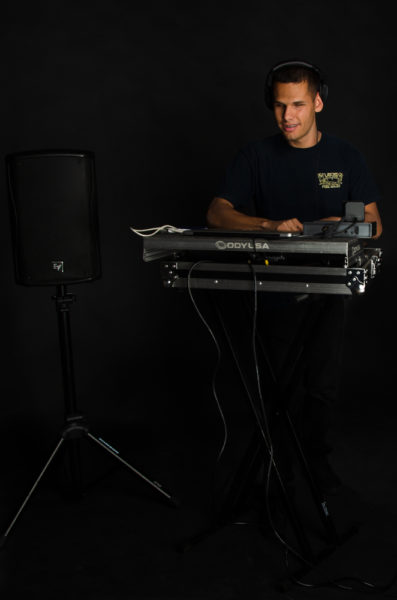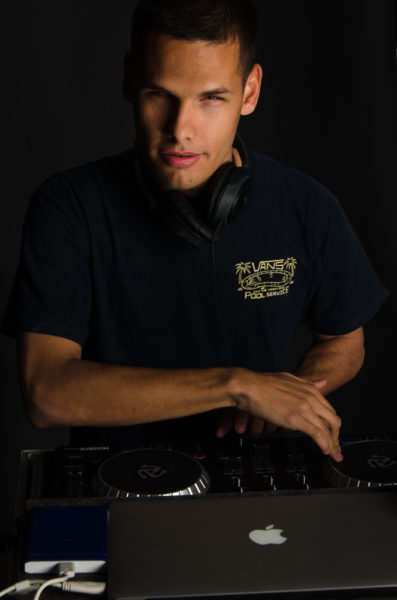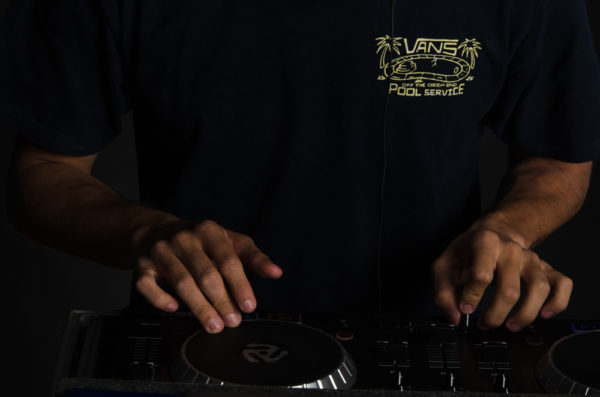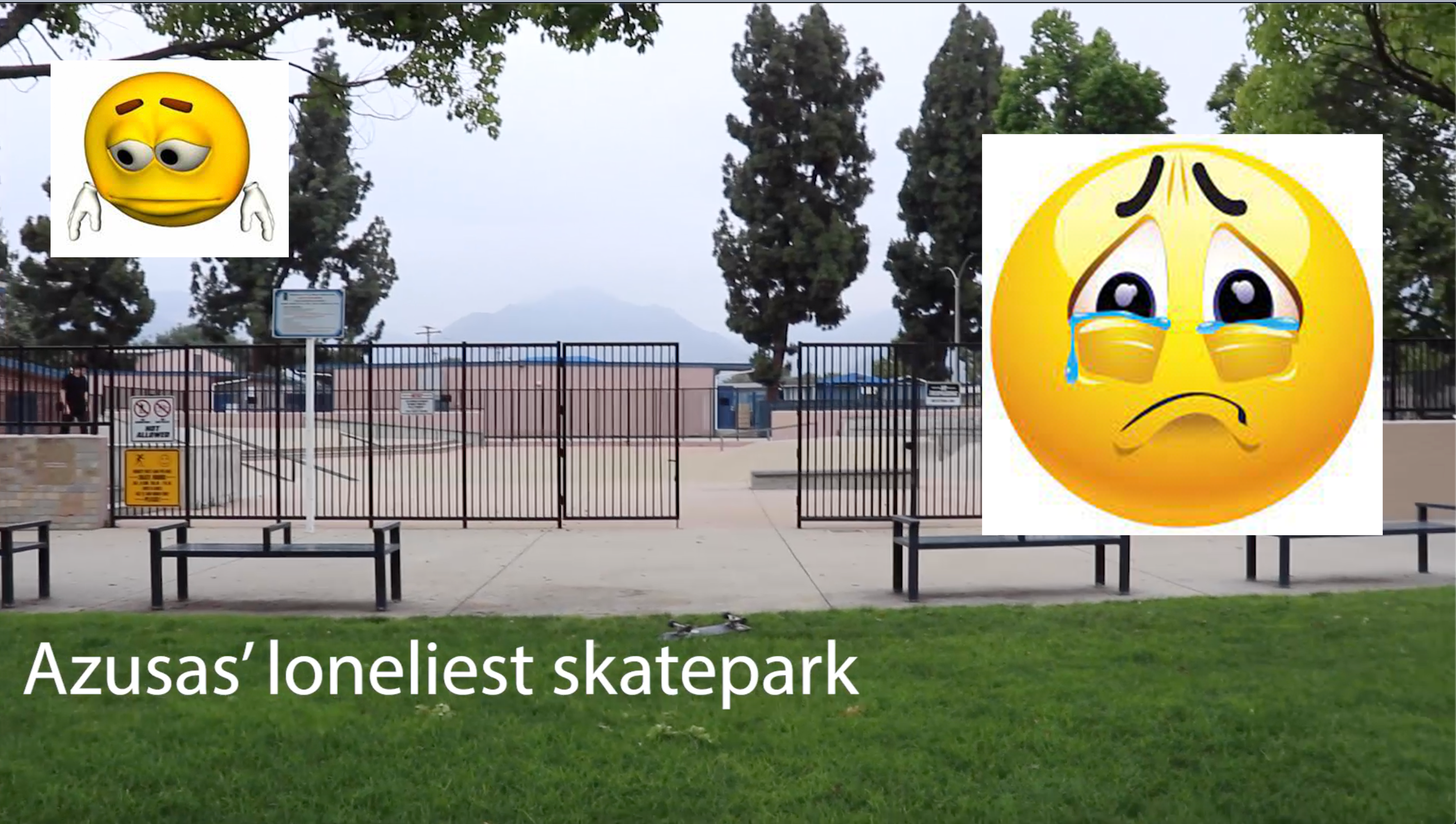Profile: Sensing Rhythm
Facing the audience, Johnny Muñoz, 22, is bright with joy as the host of a kickback for his friends in the visually impaired community.
He sits on his chair with his legs under him, one hand on the turntable and the other holding a headphone speaker to his ear as he rocks back and forth to the music behind his DJ booth in his sister’s backyard in Glendora.
Muñoz is a psychology major at Citrus by day and DJ Bin Dope by night. Well known for his buoyant personality on campus, he is even more renown within the blind community for his outgoing nature and parties.

Musician Johnny Muñoz sets up his DJ equipment on Oct. 29 at Citrus College’s photography studio. Photo by Alejandra Haro.
“If you tell me I can’t wrestle or throw parties if you tell me that blind people can’t turn up, I’m gonna throw a party and invite you and prove you wrong,” he said.
Muñoz’s mother went into preterm labor at 21 weeks. He and his twin sister Jeanney were born with retinopathy of prematurity, an eye condition affecting premature infants.
“I only weighed a pound and I died twice… I was in an incubator for six months. They told my mom, ‘he’s not gonna live … (if they do survive) give them up for adoption. You already have six kids,’” Muñoz said.
ROP occurs in 16% of all premature births. “The last 12 weeks of a normal 40 week gestation are crucial in the development of fetal eyes,” Laura and Richard Windsor, O.D., explained in an article for Vision Enhancement Magazine.
Scar tissue created by abnormal vessel growth can contract, causing retinal detachment and blindness.
“They told my mom, ‘he’s not gonna be normal. He’s going to be disabled. You need to treat him like that.’ But the aides told her ‘don’t treat him like he’s disabled, throw him on your back and tell him what you’re going to do,’” Muñoz said.
Muñoz’s mother Maria Rodriguez, 61, chose to listen to the aides and nurses and refused to give her twins up for adoption. “I knew it in my heart that they would be OK,” she said, instructing the whole family to pray from the U.S. to Mexico.
After four months in the Neonatal Intensive Care Unit, Muñoz and his sister stabilized. They both lost their vision, though she was able to recover hers last year through laser surgery.
“What made me fearless as a kid was my mom,” Muñoz admits.
Rodriguez was born in the U.S. but was raised in Agua Caliente, Mexico. She attended school through 3rd grade, left and returned as a freshman to Blair High School where she met her husband and married at 16. Rodriguez had her first child at 17, raising her family in Pasadena and Azusa.
“When I had (the twins), my whole world changed for the better,” Rodriguez said.
Of her eight children, Muñoz and his “partner in crime” are the first to graduate middle school and high school.
“Me and my twin are the only ones to come and get our degrees,” Muñoz said.
Muñoz says there is a false perception that blind people are unable to live life to the fullest. He considers it his mission to reach out and bridge the gap between his visually impaired and sighted friends.
Muñoz’s parties are no easy feat. He and his family schedule the arrivals and pickups of 20 visually impaired people through Access paratransit buses. He arranges for sighted friends to help guide others around the dance floor, pool, house and buffet.
Like any other summer pool party, everyone is on their phones. Muñoz invited everyone through Vorail, a social media app for those with vision loss.

Psychology major Johnny Muñoz shows how to spin the disc on Oct. 29 at the photography studio in the Visual Arts building. Muñoz also demonstrates smooth transitions from one song to another. Photo by Alejandra Haro.
In it, people socialize by speaking and listening to each other. Party-goers have their phones an inch from their face or ear, glowing faces smiling in response to the well wishes of friends across the state.
In the pool, Muñoz does not hold back playing Marco Polo with a beach ball, which they use instead of tagging because the game can become heated.
After diving into the deep end, Muñoz hits his friend Christina Johnson, 52, of Los Angeles square in the face with his first shot a millisecond after she says “polo.”
She returns to the surface sputtering and laughing, “Who got me?”
Muñoz created this tradition to “build a support system for each of us” allowing his friends to meet and socialize with people they exclusively knew online.
Socializing and dating have proven difficult. Once his date’s mother told her, “Stay away from the blind kid’s family. (You) can’t be hanging out with him,’” said Muñoz.
“You just think because I’m blind, I can’t do anything,” he continued.
In addition to expanding his social circle, Muñoz wants to be a mental health counselor.
“A lot of blind people post on Facebook that they want to commit suicide. The thing I do, I’ll talk to them. I say, ‘give me your number, let’s talk.’ … A lot of visually impaired people don’t have a life. I say come back to school, get a degree.”
Muñoz, dubbed DJ Bin Dope by his cousin DJ Prospect, taught himself how to DJ at 15 by listening to Big Boy’s Neighborhood on Power 106.
“I started listening to their DJ mixes and thought I’d like to copy their style, how I do it. So I started copying them when I’m scratching. Big Boy, if you get the message, I love you!” he said.
Muñoz originally called himself DJ Be Spinnin’, but his cousin corrected him one day in high school. He said that while Muñoz may be spinnin’ now, he has always been dope.
“Since he started hearing music… He was in love with Tupac. He would sing every song of his,” Rodriguez said. “Out of all my kids, he’s the only one who loves music.”
DJ Bin Dope plays a variety of hip-hop and rap, enticing the crowd to bob their heads in unison. After getting the audience active and dancing, he scratches on the turntable before introducing a couple of visually impaired friends to perform.
Ronnie Chism, 37, also known as Talksho “The Visionary,” of San Bernardino paces in thought as his friend Sylvia sings next to him. By the end of her ballad, Chism looks more self-assured and begins to rap about his cane and the struggles of becoming visually impaired later in life.
“Johnny’s never turned in. That’s a good energy to have for music,” Chism says of working with Muñoz. “He’s definitely talented, and he’s not shy to show it either.”
When he is not working towards his psychology degree or DJing private events, Muñoz practices playing beep baseball with the San Gabriel Valley Panthers before they attend the 2019 World Series in Tulsa, Okla.
“I’m inspired by everybody. I’m inspired by people that tell me I can’t do anything,” he said. “If you tell me I can’t do it, I’m gonna try to find a way to. That’s the way I am.”

Johnny Muñoz shows his hands movements on Oct. 29 at the photography studio in the Visual Arts building. Photo by Alejandra Haro.



